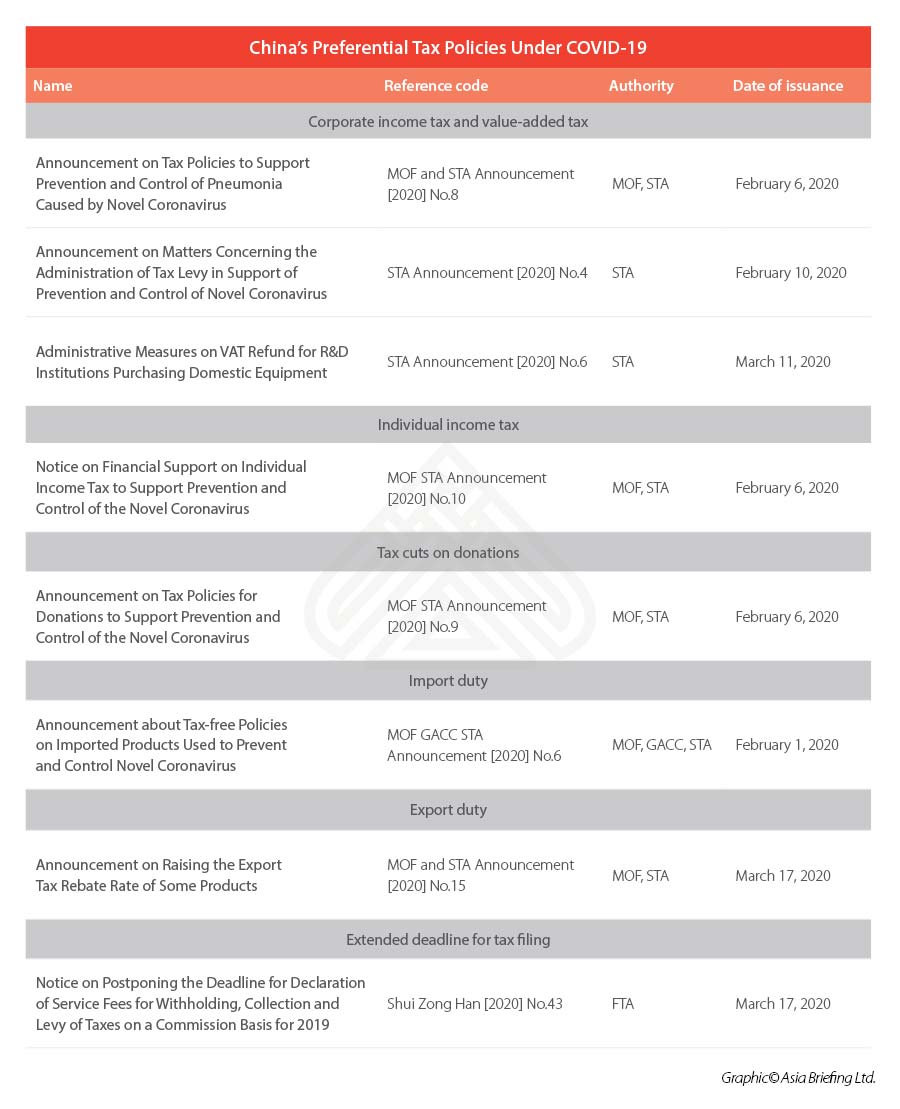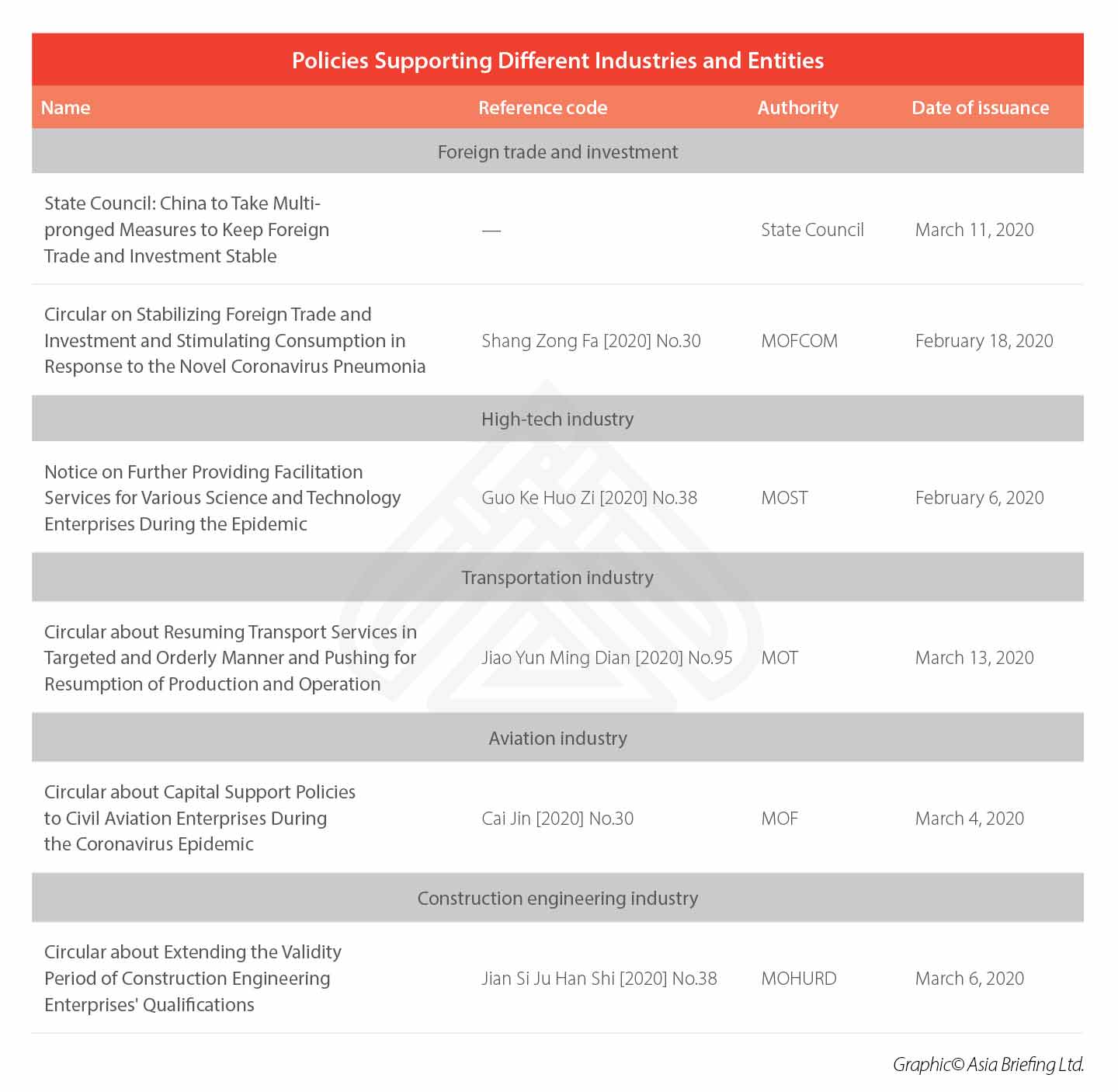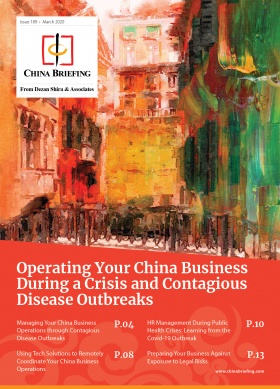How to Use China’s Preferential Policies Rolled Out amid COVID-19
To contain the impact of COVID-19, authorities at all levels of government have been rolling out policies aimed at bringing Chinese society and economy back to normal. The various policies include fiscal support for the fight against the coronavirus, measures to ensure resumption of businesses, tax waivers, relaxations in social insurance obligations, subsidies for firms, and financial stimulus.
We have compiled a comprehensive list of policies (see here) issued by China’s central and local governments for your easy reference, so interested parties can easily find the original government policy documents, their English versions, and the explanatory articles published on our website.
To help our readers better understand and leverage these policies, this article provides a holistic look on the policy directions of the Chinese government and explains key incentives of benefit to foreign investors.
We dissect the policies from four aspects – tax breaks, social insurance cuts, financial stimulus, and support for special industries and entities.
We advise businesses and individuals to first pay attention to the national polices, such as those released by the State Council and central ministries and then keep a watchful eye on whether the local government departments have released corresponding implementation measures (you may navigate the National Government Service Platform or our comprehensive list).
Tax breaks
Businesses can pay attention to three documents:
- MOF and STA announcement [2020] No.8(EN) issued on February 6;
- STA Announcement (2020) No.4(EN) issued on February 10; and
- STA Announcement [2020] No.6 issued on March 11;
Related China Briefing Article: China’s Preferential Tax Policies to Help Businesses Overcome Coronavirus Stress
Corporate income tax
The STA Announcement (2020) No.8 and No.4 mentioned two major preferential CIT policies.
The first is to allow full deduction of new equipment purchase cost without depreciation for eligible enterprises producing key supplies and materials.
The eligible enterprises are determined by the provincial government, NDRC, and MIIT. You may refer to Fa Gai Ban Cai Jin [2020] No.176 and No. 145 to see if you’re qualified.
The second is to offer five- to eight-year of loss carry over extension for enterprises in difficult industries, including transportation, catering, accommodation, and tourism (the main business of eligible enterprises needs to account for more than 50 percent of their total revenue in 2020).
Value-added tax
The STA Announcement (2020) No.8 also proposed to monthly refund the incremental input VAT for eligible enterprises producing key supplies (Fa Gai Ban Cai Jin [2020] No.176), exempt VAT of public transportation services, living services, courier delivery services, and transportation of key emergency supplies (the key emergency supplies list can be found in the Fa Gai Ban Cai Jin [2020] No.145).
STA Announcement [2020] No.6, which is effective from January 1, 2019 to December 31, 2020, allows qualified R&D institutions to make full VAT refund declaration after the purchase of made-in-China equipment. The specific conditions and scope of the R&D institution and home-made equipment can be found in MOF, MOFCOM, and STA Announcement [2019] No.91.
Individual income tax
According to MOF STA Announcement [2020] No.10 (EN), medicines, medical supplies, and protective equipment (excluding cash) issued by the enterprises to individuals for the prevention of COVID-19 are not included in wages and salaries and are exempted from personal income tax (IIT).
Tax cuts on donations
According to MOF STA Announcement [2020] No.9 (EN), any individual or enterprise that donates cash or materials responding to the COVID-19 outbreak through qualified social organizations, governments or their departments above the county level, or directly to the designated hospitals are able to enjoy a full deduction on their corporate income tax or individual income tax.
Enterprises, individual industrial and commercial households that donate self-produced, commissioned, or purchased goods through the eligible channels mentioned above can receive exemptions on their VAT, consumption tax, urban maintenance and construction tax, and education surcharge.
Import duty
Based on MOF GACC STA Announcement [2015] No.102 (EN), the MOF GACC STA Announcement [2020] No.6 (EN) expanded the scope of duty-free imports. Imported supplies used for COVID-19 epidemic prevention and control can be exempted from import duties, VAT, and consumption tax.
Export duty
MOF and STA Announcement [2020] No.15 issued on March 17, which has been effective from March 20, increased tax rebate rates for around 1,464 products. Companies in China who export the listed goods destined for overseas markets can enjoy higher tax rebates.
Related China Briefing Article: New Export Tax Rebates, Customs Duty Exemptions for China-Based Trading Companies
Extended deadline for tax filing
During the last three month, STA has been delaying tax filing deadlines in February, March, and April for taxpayers who file monthly or quarterly tax returns.
On March 17, STA issue one more document to extend the deadline for commissioned withholding and collection of taxes – Shui Zong Han [2020] No.43. The deadline has been extended from March 30, 2020 to May 30, 2020.
Social insurance cuts
Phased reduction of the payment of three social insurances
Based on Ren She Bu Fa [2020] No.11 (EN) and Shui Zong Han [2020] No.33, eligible insured enterprises can be exempted from, reduce, or postpone the collection of three social insurances – pension insurance, unemployment insurance, and work injury insurance.
Related China Briefing article: China to Reduce Corporate Social Insurance Premiums, Defer Housing Provident Fund Payment
From February 2020, small- and medium-sized enterprises (SMEs) (referring to MIIT [2011] No.300, EN) outside Hubei province can be exempted from paying the three social insurances for no more than five months.
For large companies outside Hubei, the payment of the three social insurances can be halved for no more than three months.
All insured enterprises in Hubei province, irrespective of sizes, can enjoy the exemption of premiums of the three social insurances not exceeding five months.
For enterprises found in difficulties due to the epidemic, they can apply for a deferred payment for no more than six months without any overdue fee.
Phased reduction of basic medical insurances payment
According to the Yi Bao Fa [2020] No.6 (EN), employee basic medical insurance payment can be reduced by 50 percent for no more than five months since February 2020.
Financial stimulus
Here, enterprises should attach significance to four government documents – Yin Fa [2020] No.29 (EN) issued by People’s Bank of China (PBOC), Cai Jin [2020] No.3 and Cai Jin [2020] No.5 issued by MOF, and Yin Bao Jian Fa [2020] No.6 (EN) issued by the China Banking Regulatory Commission (CBRC).
Preferential loans and financial interest subsidies
According to the above documents, the PBOC will provide low-cost funds to nine national banks and some corporate banks located in key affected areas through relending, assisting them to provide credit support of preferential interest rates to key enterprises (referring to Yin Fa [2020] No.29).
Optimizing financing guarantee services
The governmental financing guarantee or re-guarantee institutions at all levels should cancel counter-guarantee requirements and reduce the guarantee and re-guarantee fees.
The national financing guarantee fund will halve the re-guarantee fees for all governmental financing guarantee and re-guarantee institutions in worst-hit areas.
Temporary extension of loan repayment
For loan principal of SMEs in difficulty (including micro business owners and individual industrial and commercial households) that are due since January 25, 2020, banking financial institutions shall grant to the enterprises the arrangement of temporary deferred repayment of principal for a certain period by means of loan extension or loan renewal. The repayment date may be extended to June 30, 2020 at most.
Real estate
According to Guo Shi Jian Zhu [2020] No.38, governments should help reduce the rent burden on business. With respect to real estate that belongs to state-owned assets, landlords are required reduce the rent. With respect to real estate that are privately owned, landlords are encouraged to reduce the rent, and the government may offer other benefits to such landlords.
Support for special industries and entities
Chinese authorities are offering support to industries and entities that have been especially hit by the epidemic to stabilize the economy and employment.
For instance, trading companies should pay attention to Shang Zong Fa [2020] No.30 (EN), which was issued by MOFCOM and contains measures how government departments can spur foreign trade, including simplifying the procedures of managing foreign trade, optimizing public legal services for trading firms, facilitating the development of e-commerce, and reducing import-export restrictions.
Other notices from STA and GACC may also be helpful for some trading firms, such as STA Announcement [2020] No.28 (EN), which promotes paperless export tax rebate process, GACC Announcement [2020] No.24, which allows the consignee or consignor to be excused from being present when the goods are examined by the customs, GACC Announcement [2020] No.21, which permits extension of the time limit of verification and cancellation of manual (account) of processing trade and notices encouraging paperless applications for import and export license and opening online channels for technological import-export.
Related China Briefing Publication: China’s Support for Foreign-Invested Enterprises to Cope with the Covid-19 Outbreak
To leverage these polices, we suggest investors pay attention to the central government’s policy announcements as well as relevant local polices. This will enable them to assess their eligibility and accordingly get informed of the time and process of application. You are welcome to consult with our professionals on the ground by reaching us at China@dezshira.com.
Editor’s Note: This article was originally published March 19, 2020 and was last updated April 20, 2020.
About Us
China Briefing is written and produced by Dezan Shira & Associates. The practice assists foreign investors into China and has done since 1992 through offices in Beijing, Tianjin, Dalian, Qingdao, Shanghai, Hangzhou, Ningbo, Suzhou, Guangzhou, Dongguan, Zhongshan, Shenzhen, and Hong Kong. Please contact the firm for assistance in China at china@dezshira.com.
We also maintain offices assisting foreign investors in Vietnam, Indonesia, Singapore, The Philippines, Malaysia, and Thailand in addition to our practices in India and Russia and our trade research facilities along the Belt & Road Initiative.
- Previous Article China wird 2021 die Produktion wieder aufnehmen, die USA und die EU stoßen auf einen trägen COVID-19-Rückschlag
- Next Article China Plus One Series: Understanding Malaysia’s Appeal to Foreign Investors









